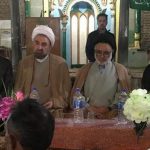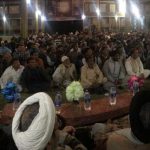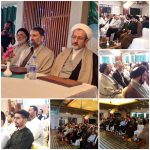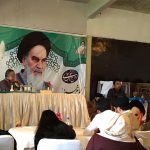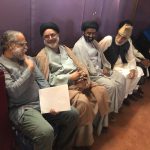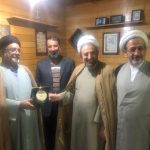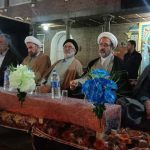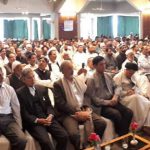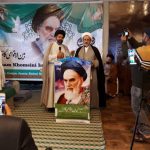The 2019 Annual International Imam Khomeini Conference, Organised by the Research Group of Anjuman e SharaieShian and Hawza Ilmiya Jamia Babul Ilm, was held in The Oriental College of University of Kashmir on June 10th to 11th.
Introduction
The Islamic Revolution achieved a goal that was desired by the Muslim for centuries after the fall of the caliphate and penetration of the Imperial forces. Though, the revolution brought about a shift in the thinking of people around the world and ‘no-East no-West’ become the slogan of the oppressed nations. Many people referred to the Islamic Revolution as a Shi’i religious revolution. Though there was a century of intellectual and political struggle at its background, it was a revolution of Mustadfeen. The charismatic personality of Ayatollah Syed Ruhullah Khomeini al-Mousavi was a huge driving force of this revolution. Ayatollah Khomeini structured the Islamic thought in such a way that people understood the true meaning of Islamic values and associated with it to achieve emancipation. The contemporary world is divided into mustadfin, and mutakabrin and Ayatollah Khomeini informed us about it many decades ago. The injustices, fake ideologies, corrupt politics and erosion of morality has become common in today’s society. The ideas and character of Ayatollah Khomeini have a lot to offer, and the need is to look at the Ayatollah from the academic standpoint to bring out the relevancies of his thought and praxis. Therefore, the conference aims to bring scholars and activists together and underline different aspects of the personality of Ayatollah Khomeini and his contribution to the contemporary world.
The broader themes include:
- Ayatollah Khomeini as a great Faqih
- Islamic Revolution and Mustadfeen of the World
- Ayatollah Khomeini’s contribution to the resistance discourse
- Islamic Political Thought and Ayatollah Khomeini
- Shi’i Fiqh and Ayatollah Khomeini
- Ayatollah Khomeini as Revolutionary, Philosopher and Mystic
- Hawza education and political activism of Ayatollah Khomeini
- Influences on Ayatollah Khomeini’s though
Report on the Conference
The Annual International Imam Khomeini Conference, 2019 was Organised by the Research Group of Anjuman e SharaieShian and Hawza Ilmiya Jamia Babul Ilem: The Oriental College of University of Kashmir at Centaur Lake View Sher-e-Kashmir International Convocation Centre, Srinagar.
The conference was attended by delegates from different countries and from different Universities in India as well.
The conference was hosted by the President of AnjumanSharaieShian and Chancellor of Jamia Babul Ile, Hujatal Islam Walmuslimeen Aga Syed Hassan al-Mosavi al-Safavi. The guest of honour of the conference was Ayatollah Dr. Muhammad Hussain Mokhtari, the chancellor of the University of Fiqh and Madhab, Tehran. The Iranian delegation was further constituted of the representative of Imam Reza (as) Holy Shrine, Dr Ghulam Raza Raisiyan, Dr Ahmed Rahdar, the renowned analyst and scholar and professor at Baqar-ul-Uloom University, Qom. The other prominent speakers were Prof. AK Ramakrishnan, Jawaharlal Nehru University, New Delhi, Prof.Sheikh Showkat Hussain, University of Kashmir, Prof. Noor Ahmad Baba of the Central University of Kashmir, Prof. Syed Mehmood Mehdi Rizvi, Gh. Hassan Baba, Justice Imtiyaz Hussain, Ahmed Ali Fayaz, a senior columnist and political analyst.
The speakers enlightened the audience with different aspects of the thought of Imam Khomeini that are called Khomeinism and underlined the importance of the revival of Khomeinism in contemporary time. The Khomeinism unanimously was called as a powerful ideal against the ignorance as well as arrogance present in the present time at every step of human life. The Imam was recalled as a great mystic, a path-breaking rationalist (philosopher) and a great jurist and a complete human being.
Prof. AK Ramakrishnan said that Imam Khomeini changed the course of contemporary history by challenging East (communism) and West (liberal capitalism) and restored the place of religion. The president of the Anjuman also recalled the Khomeinist appeal for the unity of Muslims and highlighted its importance in the world that is taken over by the arrogant forces.
Prof.Showkat stressed on the research on the Imam’s connection with Kashmir and revival of Persian language in the region.
Prof. Baba conceptualised the concept of Vilayat-e-Faqih as a non-western political system that other Muslim countries and examine. The Lebanese (half-Palestinian) scholar threw light on the lived experiences of Palestinians and the Impact of Imam Khomeini. The research scholars from Jawaharlal Nehru University, Aligarh Muslim University, University of Kashmir, Baba Ghulam Shah Badshah University, Islamic University of Science and Technology, Shah-e-Hamadan Institute of Islamic Studies, presented papers on different themes of the conference and the scholars were later felicitated with certificates.
The umbrella organisation, AnjumanSharieShian signed MOU with the Imam Reza (as) Holy Shrine, Mashhad and University of Islamic Dominations, Tehran.
The parties to the MOU agreed to cooperate in the fields of education, research and cultural exchange. The proceedings of the conference will be published in the veteran journal of the Anjuman, Akhbar al-Irshad or Al-Irshad.
The conference laid a greater impact on the intellectual and scholar community and different voices on the subject also found a platform. This initiative will further deepen the understanding of Shi’i Fiqh and political thought and encourage scholars to write and study more about it.
The report was prepared by Khairunnisa Aga, Doctoral Candidate, Centre for West Asia Studies, School of International Studies, Jawaharlal Nehru University, New Delhi
 Ijtihad Network Being Wise and Faithful Muslim in the Contemporary World
Ijtihad Network Being Wise and Faithful Muslim in the Contemporary World
